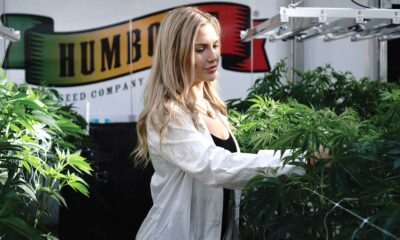
Economics
Official ‘Made In Alaska’ Cannabis Is a Thing Now
Normalization of cannabis commerce is crucial to the long-term success of legalization, and official state recognition is a big deal. Without real progress on the banking front, it’s a largely symbolic advancement, but one with the potential for real benefits moving forward.
Alaskans looking to support their state’s local cannabis industry will have a much easier time now that the state’s official “Made In Alaska” logo will be available to cannabis businesses with products that are at least 51 percent Alaskan in origin.
This is a major advancement — at least symbolically — for cannabis businesses seeking a foothold of legitimacy in the still developing legal market.
A report from the Juneau Empire quoted industry leaders, who were uniformly optimistic about the continued normalization of cannabusiness.
From the Empire:
Cary Carrigan, head of the Alaska Marijuana Industry Association trade group, said the “Made in Alaska” decision matters because it’s a sign the state is continuing to normalize its attitude toward marijuana and treat marijuana businesses the same as others.
But while normalization is a key component of advancing the legal cannabis industry, it can only go so far when the weight of federal law is holding down the growth of that industry: The only reason these businesses can participate in the “Made In Alaska” program is because it operates at the state level, completely independent of federal funding.
That same legal framework is why you won’t be seeing “Alaska Grown” cannabis any time soon; that program does receive federal funds.
And while all sources interviewed were positive about the development on balance, one expressed concerns about the broader issues facing the industry.
From the Empire:
Jennifer Canfield, one of the owners of Green Elephant Gardens in Juneau, said the state’s decision is good news, but marijuana businesses still face obstacles that other businesses don’t, particularly in the way that they’re banned from the federally regulated banking system.
“It’s always good news when we gain opportunities that any other business has access to, but unfortunately, I can’t even take a ‘Made in Alaska’ certification to the bank,” she said.
That broader obstacle — the lack of traditional banking options for cannabis companies — is one of the main issues facing the growing legal cannabis industry in the United States.
This lack of banking options means instead of the U.S. being an example to the world, it’s a mess of cash counting machines and half-baked cryptocurrency schemes, which is allowing other countries to surpass the states in the global market. Without the stability and safety of basic banking services that other industries take for granted, growth will remain stunted.
But for cannabis businesses looking to identify their product as local and set it apart, the “Made In Alaska” recognition could go a long way towards developing a positive brand identity. In fact, the possibility of attracting business from tourists may improve with adoption of the logo.
From the Fairbanks Daily News-Miner:
Kim White, owner of Smilin’ Moose Gifts in Delta Junction promotes made in Alaska [sic] products to her local and global clientele and locally to Rika’s Roadhouse near Delta.
“In fact, our customers have told us that the tour bus drivers tell them to select Made in Alaska products to be sure they are getting a real Alaskan-made product,” she said. “We are seeing this happen more each year with our customers from France, Germany, the UK, Australia and elsewhere.”
TELL US, would you be more likely to purchase certified local cannabis products?























